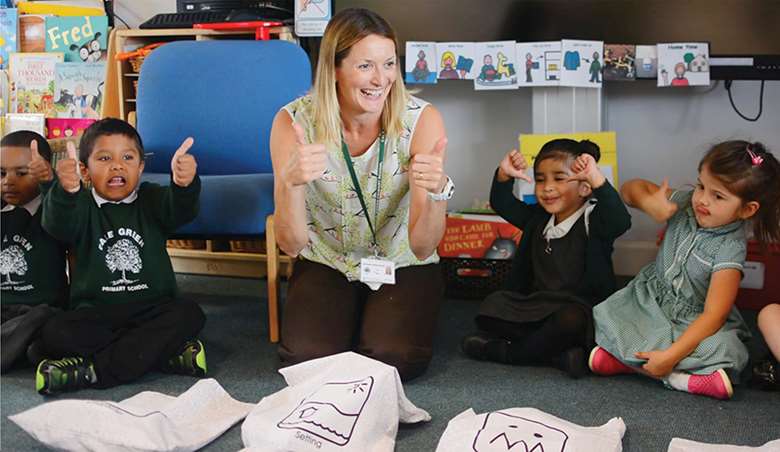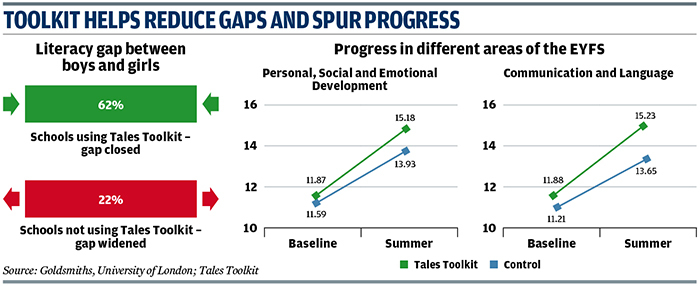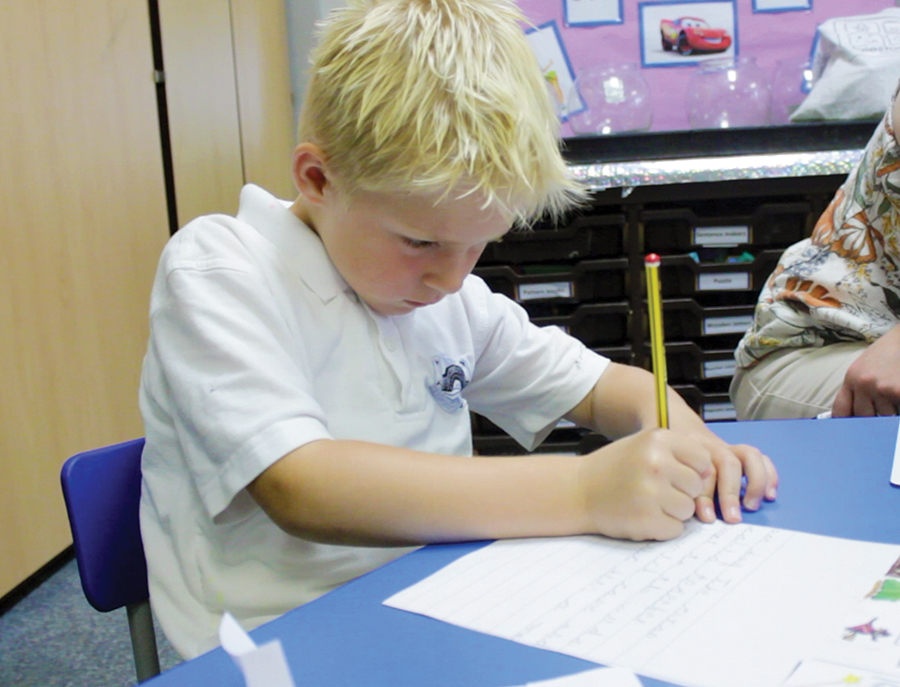Bags of inspiration to improve literacy skills
Charlotte Goddard
Monday, April 29, 2019
Storytelling initiative supports development of children's communication and language skills, helping to tackle early disadvantage through creative learning.

PROJECT
Tales Toolkit
PURPOSE
To support early learning and development through storytelling
FUNDING
A Teach First Innovation Award (£15,000 plus advice and resources such as office space), the UnLtd Do it Award (£5,000) and the UnLtd Grow It Award (£15,000). The organisation is now sustainable through sales of the toolkit at £800 each
BACKGROUND
Kate Shelley's work as an Early Years Foundation Stage co-ordinator, locality lead for children's centres and deputy head in a nursery school and children's centre led her to develop the Tales Toolkit. Based in disadvantaged areas of London, she saw children coming into nursery with limited communication and language skills, high levels of special educational needs and disabilities (SEND) and English as an additional language, and was keen to find a way to support them.
Research has shown story-telling by children is positively associated with language skills and creative play, boosting vocabulary and imagination, and the quality of a child's storytelling is predictive of their reading ability. Quality interactions between adults and children, where adults are tuning into children and responding to their needs, have also been shown to be crucial in tackling early disadvantage. "Everything we do is around creating quality interactions between children and the people around them," says Shelley. "We aim to get children talking and asking questions and being curious about things."
ACTION
When settings sign up for Tales Toolkit they receive online training in the form of five 50-minute films designed to be delivered over five months during staff meetings. Staff also complete tasks between sessions, and can share ideas with other schools through online forums.
At the heart of Tales Toolkit are four symbols used to represent story structure - character, setting, problem and solution. There are four "big bags" which settings are encouraged to fill with their own props to represent these different elements. "When they first start we encourage them to use simple things that children can relate to like toy spiders, dragons, or things they have brought from home," says Shelley. "Over time the props become more obscure - you might get to the point where you are putting four sticks in, and a piece of crinkly material, and children are telling stories with those."
Children sit on the carpet and share their ideas on how the four elements can come together to make a story. Sessions are interactive and often include music, sounds and movement. Settings can use the toolkit in different ways. At the Downs Primary School and Nursery in Essex, a teacher will use the big bags to encourage children to discuss and concoct stories. At the same time a teaching assistant will sit with children with additional needs and use a smaller version of the bags, allowing them to touch and explore the props. "That way they are part of the main group but are still getting some individual support," says nursery teacher Cat McCabe. "All the children are completely engrossed."
When the children have understood the concept there are other resources that can be provided throughout the settings for them to access when they want to. These include story templates which they can use to create their own stories, sticking or drawing pictures in each section. Teachers can "scribe" the stories for children or older children can have a go at writing themselves. Other resources include aprons with pockets illustrated with the appropriate symbols so children can wander around and collect props to make their own stories. Shuffle books can be filled with pictures of different characters, settings, problems and solutions, and children can flip the book's sections to create different story combinations.

OUTCOME
Tales Toolkit is used by more than 130 schools across 11 different countries. An evaluation carried out by Goldsmiths, University of London, found boys who had a year of doing Tales Toolkit showed significantly greater catch-up in literacy scores with their female peers than boys who had not been in a Tales Toolkit setting. When first assessed, boys were around one point below girls across all settings, but by the summer, boys in Tales Toolkit settings had seen that gap close by 62 per cent and there was no longer any statistically significant difference between boys' and girls' literacy scores.
The data showed children in the Tales Toolkit group made greater gains in all seven EYFS areas of learning than those in the comparison settings.
In the initial trial schools, children using Tales Toolkit for one term saw an additional 24 per cent progress in "communication and language" and an additional 34 per cent progress in "expressive art and design". In one school, children with SEND made 30 per cent additional progress in "personal, social and emotional development" compared with their non-SEND peers during one term of using Tales Toolkit.
WHAT'S NEXT?
Shelley is starting to trial Tales Toolkit with childminders and private, voluntary and independent nurseries. "Three or four childminders are trialling it at the moment," she says. "The best way to do the training is as a team, so people can bounce ideas off each other, so each childminder will have an individual password to log in but the local authority will bring them together for group training." Schools in a number of different countries are already using the toolkit and Shelley is about to start working with a group of Russian schools.
- If you think your project is worthy of inclusion, email supporting data to derren.hayes@markallengroup.com

EXPERIENCE
SMITHY BRIDGE PRIMARY SCHOOL, ROCHDALE
In July 2014, Smithy Bridge Primary School noticed a significant drop in results for boys' writing at the end of the Early Years Foundation Stage (EYFS). "I tried many interventions and strategies, and they did have some impact but I was still looking for new ways to motivate and inspire the children, especially the boys, to want to write," says Katy Copeland, foundation stage leader at Smithy Bridge.
The school started using Tales Toolkit in 2016 for its nursery and reception children, and now also uses it in Year 1. "The nursery children have at least one big bag story a week," says Copeland. "On top of that the resources are out in the provision all the time for them to access, in the book corner, the mark-making area and outside." In the nursery, teachers usually write down the stories the children tell, and the children write their name or sometimes simple words like "cat", while in reception children are able to write full sentences.
"When we introduced Tales Toolkit I could see the impact immediately," says Copeland. "We have a lot of children with English as an additional language and I could see they were really included and enabled to get involved. With every story children do something that is unexpected and they feel it is safe, nothing they say is wrong."
Parents are also involved - the setting sends home story strips with photos of the objects in the bags so children can retell their stories at home. "The way the detail develops through the year is incredible," says Copeland. Big bags and shuffle books are also sent home on a rota basis, and parents are invited to join in the big bag stories in the setting.
After the first year using Tales Toolkit, Smithy Bridge saw a significant rise in the number of children achieving a "good level of development" at the end of the EYFS. "We had a much higher number of children reaching or exceeding levels in many areas of learning and the overall score for our boys increased," says Copeland. "It's difficult to think of an area that has not been impacted by Tales Toolkit."




